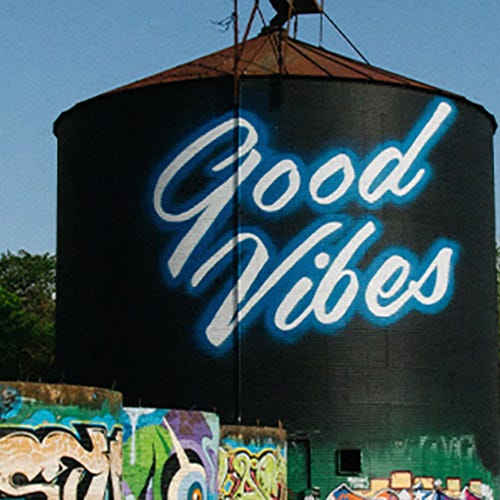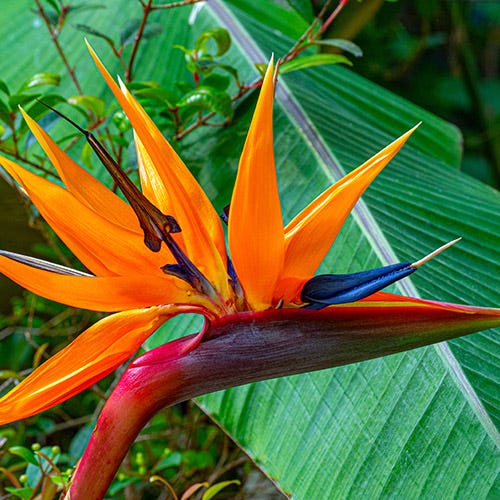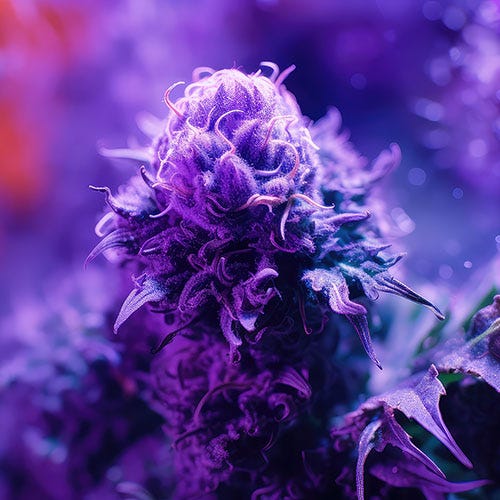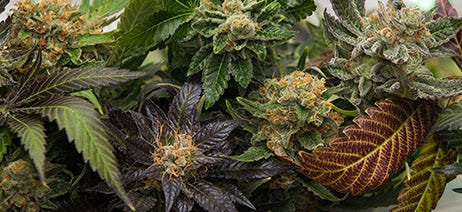
Indica vs. Sativa vs. Hybrid: Choosing the Right Cannabis Strain
If you’ve ever felt overwhelmed trying to pick the perfect cannabis strain, you’re not alone. With so many options on licensed dispensary shelves, knowing the difference between indica vs sativa vs hybrid strains can help narrow your choices. While these classifications were once used to describe plant characteristics and potential effects of cannabis consumption, they’re not as cut-and-dried as they seem. In this guide, we’ll break down everything you need to know about these types of cannabis so you can make the right choice.
What Are Cannabis Strains?
A cannabis strain refers to a specific variety of the cannabis plant, typically bred for distinct characteristics like flavor, cannabinoid content, or growth traits.1 Historically, strains were categorized into indica or sativa, with original varieties, known as landrace strains, naturally evolving in specific regions worldwide.2
Early classifications relied on plant morphology: indica plants were short and bushy, adapted to colder climates, while sativa plants were tall with thin leaves, thriving in tropical regions. However, most modern cannabis strains are hybrids, meaning true 100% indicas and sativas are rare unless they’re landrace strains.3
Further complicating things, recent research suggests that “indica” and “sativa” have mainly become unreliable in predicting a strain’s effects or chemical makeup. Instead, factors like cannabinoids and terpenes provide a more accurate understanding of what to expect.4
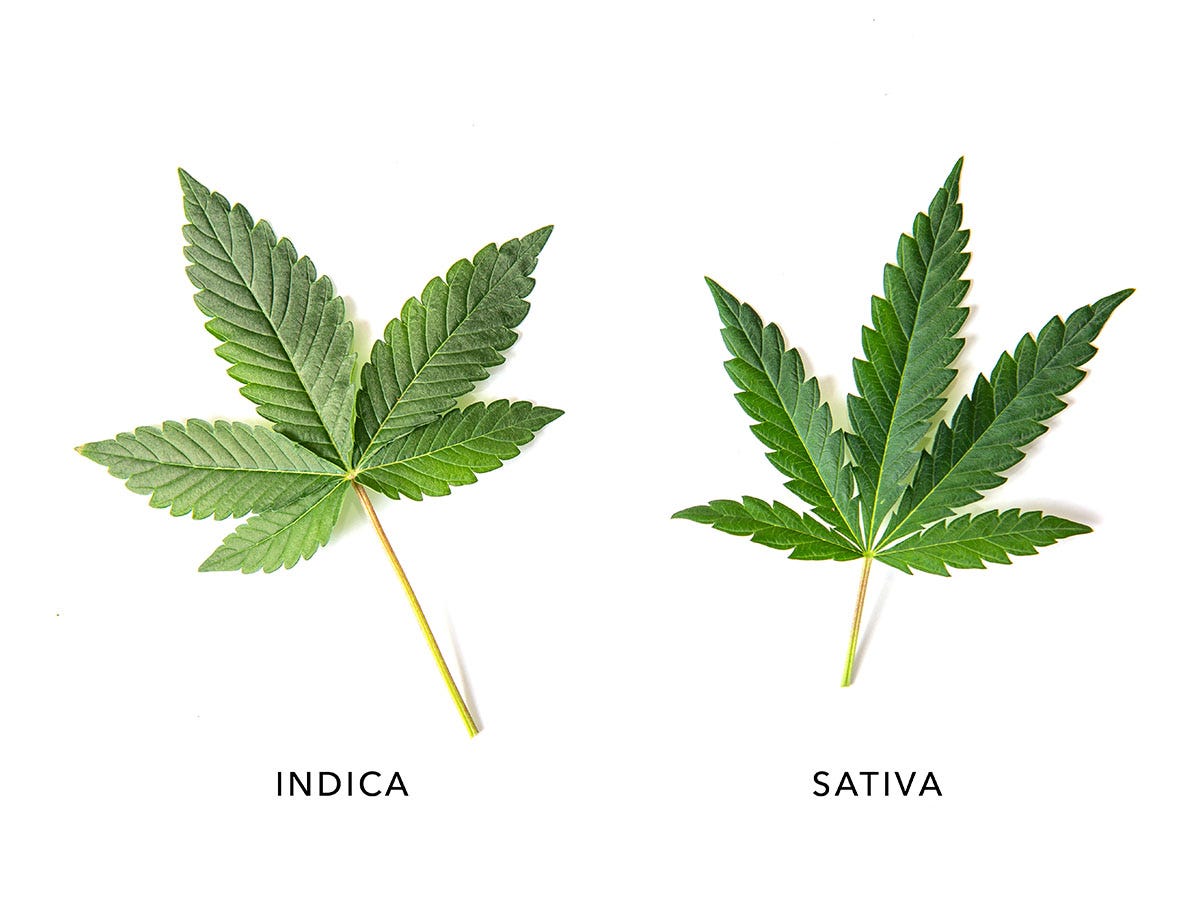
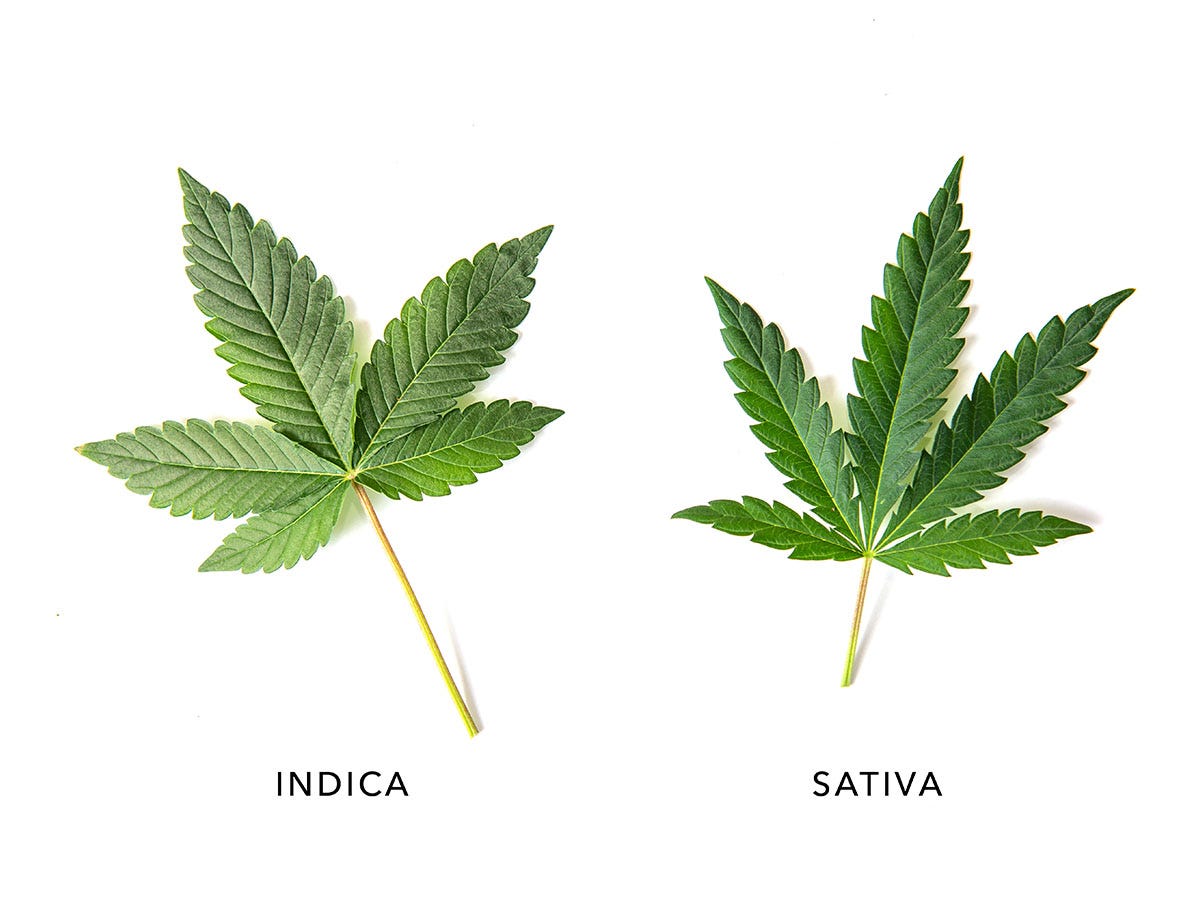
Key Characteristics of Indica, Sativa, and Hybrid
Although the classification system isn’t foolproof, indica, sativa, and hybrid strains offer general guidelines for their physical traits and growth patterns.
Indica Strains
Indica strains are often associated with short, bushy plants with wide leaves and a shorter flowering time, thriving in colder climates like Central Asia. They are renowned for their high resin content, historically valued for making hash.5
In cannabis lore, indicas are celebrated for their relaxing, body-centered effects and calming reputation, often humorously referred to as “in-da-couch” for their supposed ability to leave you feeling sedated. However, it’s important to note that this idea is based more on perception than fact. The differences in cannabis effects are primarily attributed to terpenes rather than cannabinoid content. For example, the “couch-lock” effect is often linked to indicas because of the terpene myrcene, known for its sedative properties.6
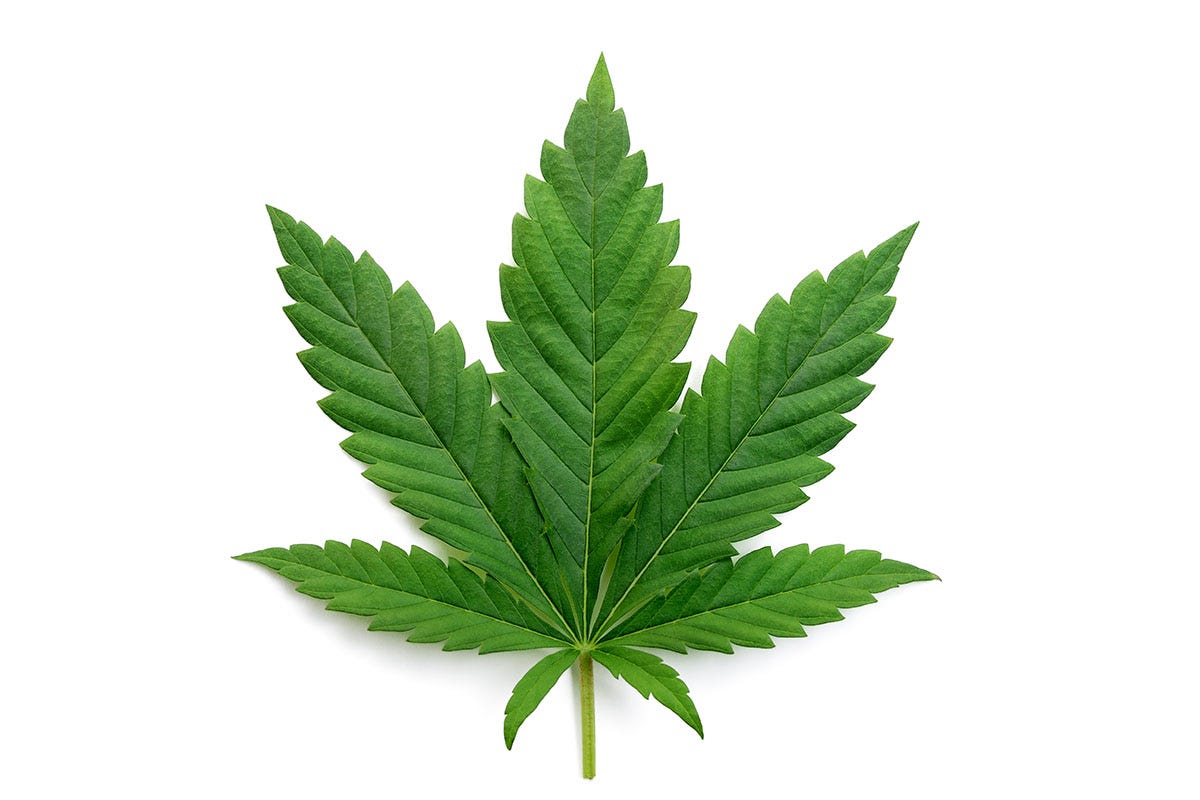

Sativa Strains
Sativa plants are tall and slender with thin leaves, naturally thriving in tropical regions like Africa, Southeast Asia, and Central and South America. These plants require longer flowering times and plenty of sunlight, making them well-suited to warm climates.7 Many famous sativa strains, such as Durban Poison and Acapulco Gold, are named after their places of origin, highlighting their connection to specific landrace varieties.8
Common mythology says sativas are often described as providing an energizing, cerebral high that’s ideal for daytime use. However, it’s important to recognize that these perceived effects aren’t universal and are based more on anecdotal tradition than scientific evidence. The uplifting sensations attributed to sativas are more accurately linked to their terpene profiles, particularly high levels of limonene, known to boost mood.9
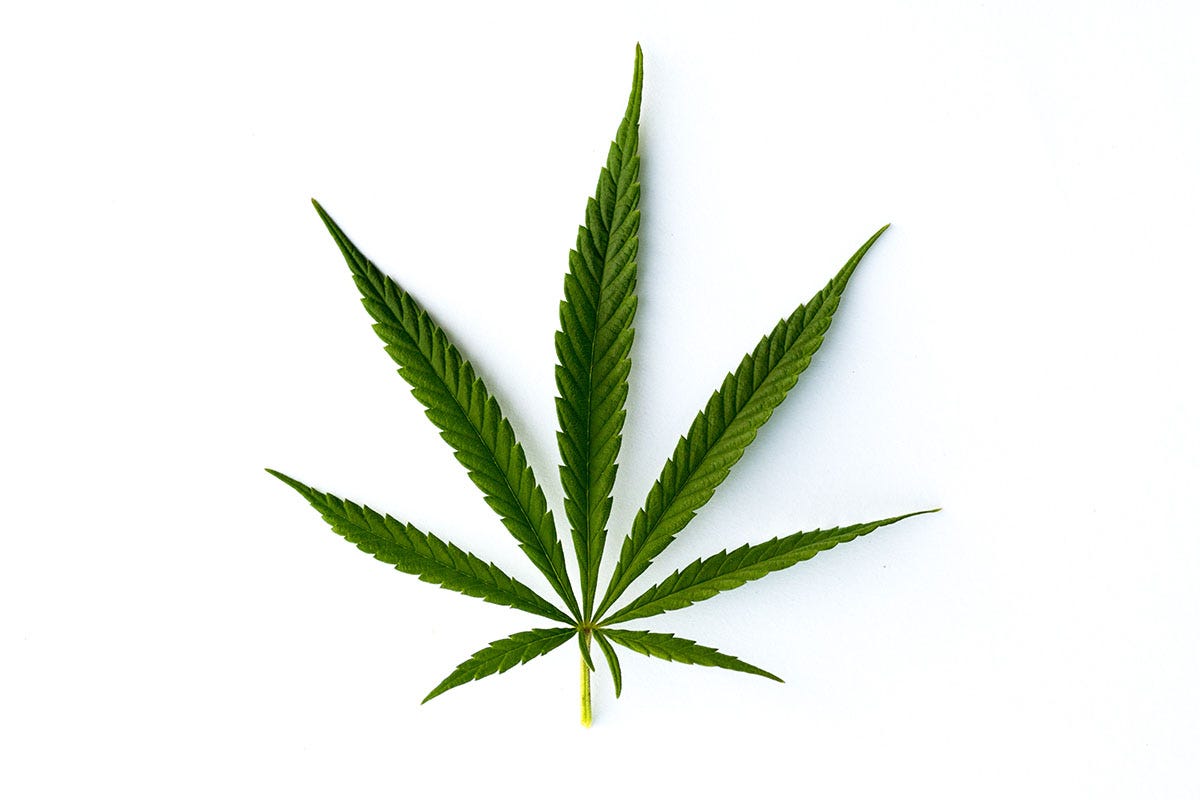

Hybrid Strains
Hybrid strains are the result of crossing two or more cannabis strains, blending characteristics from indica and sativa plants. These hybrids can lean toward being indica-dominant, sativa-dominant, or achieve a balanced mix of traits (where they are 50% sativa and 50% indica). This versatility allows breeders to create strains with particular effects, flavors, and growth patterns, making hybrids a popular choice for both recreational and medical cannabis consumers.
Landrace Strains
Landrace strains are the origins of the cannabis hybrids we know and love today. These plants are 100% sativa or indica, growing natively in specific regions around the world for thousands of years.
Because hybrids are carefully bred, their effects can vary widely depending on their cannabinoid and terpene profiles. With countless hybrids on the market, they offer something for everyone, whether you’re looking for relaxation, focus, or a balanced experience.10
How to Choose the Right Strain
While the indica vs sativa classification is a helpful starting point, it doesn’t give the whole picture. Instead, focus on understanding the cannabinoids and terpenes in your cannabis.
Cannabinoids like THC and CBD influence the effects, while terpenes impact the flavor, aroma, and experience. Reading labels and tracking how specific strains affect you can help you find the perfect match.
How Strains Are Named
Don't choose a strain based soley on its name! There are a variety of methods cultivators use to come up with names for marijuana strains.
Exotic (Zaza Strains)
Zaza is a slang word that refers to rare, premium marijuana. A typical zaza strain is going to be hard to find, and it will likely pack a punch, leaving an impression on just about anyone who indulges in it.
Strongest Marijuana Strains
Cannabis strains come in various potencies: some are more mild and preferred by beginners and microdosers, while others are more mighty. If you’re looking for the strongest indica and sativa strains of marijuana, look no further.


Answering Indica vs Sativa FAQs
Deciding between sativa vs indica vs hybrid strains can feel like a puzzle, especially with all the buzz (and misconceptions) surrounding them. Don’t worry—we’ve got you covered. Here are answers to some of the most common questions to help you navigate your options like a pro. Or you can chat with your favorite Verilife budtender if you want to know more or need help choosing the right cannabis strain.
Which strain is better for sleep—indica, sativa, or hybrid?
It’s a common misconception that indica is always better for sleep. While many people associate indica strains with relaxation, the real factors to consider are the terpenes and cannabinoids in the strain. Always check the strain’s profile and choose one that matches your needs.
Are hybrid strains always 50/50 indica and sativa?
No, hybrids can lean heavily toward being indica or sativa dominant, or be evenly balanced with a 50:50 sativa-to-indica ratio.
How do I know if I need indica or sativa?
Your best bet is to talk to your budtender and explain what you’re hoping to feel. They can help guide you toward a strain with the right cannabinoid and terpene profile to match your vibe.
What are the most popular hybrid cannabis strains?
Some favorite hybrid cannabis strains include Blue Dream, Sour Diesel, and Girl Scout Cookies. Of course, there are many more, so ask your favorite Verilife budtender if you’d like more options.
Do indica strains always make you sleepy?
Indica strain doesn’t necessarily always make you sleepy. How you feel and the effects of the strain depend on its terpene and cannabinoid content.
How can I find the best cannabis strain for my medical needs?
Talk to your budtender and focus on cannabinoids and terpenes.
What’s the best way to try a new strain for the first time?
Ensure your schedule is clear, and avoid driving until you know how it affects you.


Choosing Between Sativa vs. Indica vs. Hybrid
While the terms indica, sativa, and hybrid provide a general framework, they’re not the final word on what you can expect from a strain. By understanding cannabinoids, terpenes, and how these compounds interact in the entourage effect, you can find the perfect cannabis for your needs. When in doubt, visit your local Verilife dispensary and talk to a budtender—they’re there to help!
Sources:
1. “Strain,” Leafly, https://www.leafly.com/learn/cannabis-glossary/strain
2. “Indica vs sativa vs hybrid: Understanding weed strains,” Weedmaps, https://weedmaps.com/learn/the-plant/difference-between-indica-sativa
3. “History of cannabis,” The University of Sydney, https://www.sydney.edu.au/lambert/medicinal-cannabis/history-of-cannabis.html
4. “Sativa and indica cannabis labels “meaningless” according to joint study,” Packaging Insights, October 26, 2021, https://www.packaginginsights.com/news/sativa-and-indica-cannabis-labels-meaningless-according-to-joint-study.html
5. “Indica vs. sativa vs. hybrid strains: understanding the differences between weed types,” Leafly, March 14, 2023, https://www.leafly.com/news/cannabis-101/sativa-indica-and-hybrid-differences-between-cannabis-types
6. “The Cannabis sativa Versus Cannabis indica Debate: An Interview with Ethan Russo, MD,” National Library of Medicine, January 2016, https://pmc.ncbi.nlm.nih.gov/articles/PMC5576603/
7. “Top 18 Landrace Strains from Africa,” Cannabis Training University, https://cannabistraininguniversity.com/strains/landrace-strains/
8. “Cannabis Strains Native to Mexico,” Pharmacology University, https://www.pharmacologyuniversity.com/single-post/cannabis-strains-native-to-mexico
9. “Indica vs Sativa: A Guide to Types of Cannabis Explained,” Canna Connection, April 28, 2023, https://www.cannaconnection.com/blog/11392-difference-indica-sativa-ruderalis-hybrid-plants
10. “Sativa vs. Indica vs. Hybrid Cannabis: How They’re the Same (and How They’re Different),” Leafwell, October 7, 2024, https://leafwell.com/blog/sativa-indica-difference-which-is-right-for-me



